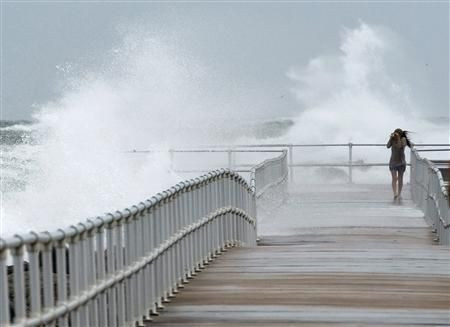Hurricane Sandy: Twitter, Facebook Emerge As Lifeline During Disasters Despite Pranks

Even as Hurricane Sandy continues to pound the U.S. East Coast, new lifelines emerged on social media – Twitter and Facebook – that turned newswire-cum-hotline despite attracting equally high number of pranksters.
A search for #Sandy on Twitter revealed over 200 new tweets at the time of writing this article where government agencies including Federal Emergency Management Agency (@FEMA) to @NotifyNYC vie for attention along with tweets from media outlets and concerned individuals.
Simultaneously, the social media network was also under siege from pranksters who seized the opportunity to disseminate rumors, morphed images and false tweets.
Pranks encompassed tweets that stated New York Stock Exchange was submerged several feet under water, Reuters reported adding that though denials followed from the exchange, certain amount of damage was done as the tweet was re-tweeted several times and also reported on-air by CNN, followed with retraction.
However, this not the first time that Social Media network is being employed to disseminate news during natural calamities, for Twitter coverage spread like wildfire even during tsunami attack in Japan.
Several residents appealed for help to save the trapped relatives and friends using the Fire Department's @fdny account.
Jeannette Sutton, a sociologist with University of Colorado who received funding from the National Science Foundation and the Department of Homeland Security to study "Social Media Uses In Disaster Management," told Reuters that government agencies were skeptical until recently about using Social Media during natural disasters.
"There's a big problem with whether it's valid, accurate information out there," Sutton told Reuters. "But if you're not part of the conversation, you're going to be missing out."
What appeared to mar the credibility of the network was the indiscriminate dissemination of fabricated tweets. Especially those from the Twitter account @comfortablysmug that claimed the NYSE was underwater.
Apparently, the account is owned by Shashank Tripathi, a hedge fund investor and campaign manager for Christopher Wight, the Republican candidate representing New York's 12th District in the U.S. House of Representatives, Reuters pointed out.
Explaining its stand on such tweets, Twitter said that it would not consider suspending the account unless a request is received from a law enforcement agency.
"We don't moderate content, and we certainly don't want to be in a position of deciding what speech is OK and what speech is not," Rachael Horwitz, Twitter's spokeswoman, told Reuters.
Even Ben Smith, the editor at Buzzfeed, seemed to echo her views. Buzzfeed, the first to reveal Tripathi, stated Twitter's credibility will not be affected by rumormongers as netizens tread on self-correct path and identify falsehoods.
The emergence of Twitter was clearly underscored when Smith felt the need to update information via Twitter and Facebook Monday, than his publication that turned inaccessible when the blackout crippled the site's servers in downtown Manhattan.
To sustain readership, Buzzfeed's staff reportedly commenced publishing on Tumblr, and Smith personally handled Buzzfeed's Twitter account to stay on top of things.
"Our view of the world is that social distribution is the key thing," Smith told Reuters. "We're in the business of creating content that people want to share, more than the business of maintaining a website."
Several other websites also witnessed technical issues forcing their sites to go offline temporarily.
On Facebook, the top status update Oct. 30 was “We are ok,” written by people reassuring their friends and relatives.
© Copyright IBTimes 2024. All rights reserved.




















